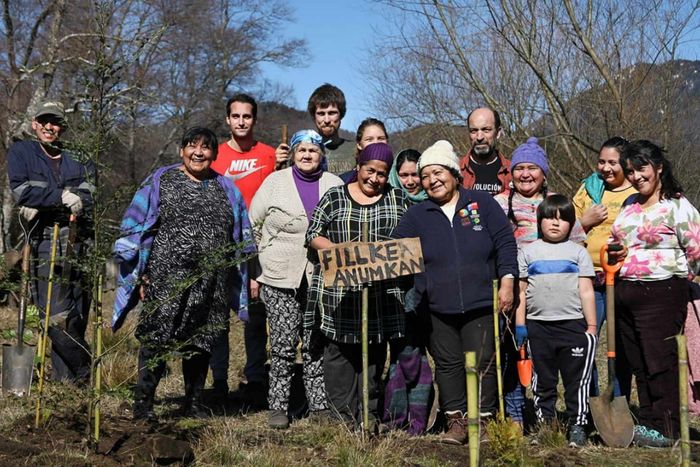In Chile, on Mapuche land, a community tourism company created a new source of income for the villagers associated with them. They engage in reforestation with trees grown by themselves, drawing on the traditional knowledge of the Mapuche.
The last 16 months in Chile were hard. “El Estallido Social” (The Social Outbreak) against social inequality in the country escalated on October 18th, 2019 with massive demonstrations and severe riots. Shortly after, COVID-19 caused economic and social uncertainty. However, in the Southern Andes there are people who know how to stand up again and again. In reforestation a small group of villagers found resilience in uncertain times.
In 2016, a group of families, most of them indigenous Mapuche, created Rutas Ancestrales Araucarias (RAA), a community tourism company that offers tourism services around Curarrehue, Araucanía Region. The tours they offer are based on the ancestral knowledge of the Mapuche. The pandemic reduced visitor numbers from 600 in 2019 to only 53 in the last 12 months. The company finally decided to suspend the tourism operations, due to the restrictions in the COVID-19 context.
“We hoped that the pandemic would be shorter and we would return to a certain normality after the first months. Unfortunately, this did not happen and we had almost a year without visitors”, explained Romà Martí (55), co-founder of RAA. He is also the coordinator of ‘Wiñolfe Anumka’, the new project organized by the company that is looking for new income by growing native trees.
Two years ago, a tourism company from Pucón, one of most touristic places in Chile and near to Curarrehue, asked RAA for a proposal of reforestation to offset their own carbon footprint. This was the first step in extending RAA’s activities beyond tourism. Ten families associated with RAA founded ’Wiñolfe Anumka’. It is a nursery network where each member receives an income from growing and selling native trees and offering CO2 offsetting services. Individuals, companies, and organizations may use a CO2 calculator in the ’Wiñolfe Anumka’ website, that will be launched soon, to measure their carbon footprint and support the reforestation campaigns.
“Some of our members have experience in native trees reproduction and all of them have experience with vegetable gardens and nurseries. They live very close to the native forest with the best conditions for this project”, explained Martí. The network has already set up two nurseries and will build another three in March. With five nurseries working, RAA hope to grow 2,500 trees per year and cover about 1.5 hectares.
Travelling Trees
‘Wiñolfe Anumka’ means ‘Travelling Trees’. During the meeting at which the participants decided on the name of the nurseries network, they agreed: “We want to see the trees leave from Curarrehue to restock the places where they were gone”. The forest is a central theme in the Mapuche’s world view and the purpose of reforestation is not only to increase incomes. The Mapuche are reforesting to protect the lives of their people and the planet.
Raquel Marillanca (60) was born in Curarrehue and is part of the ten families that began with the reforestation. In her huge garden, she will plant trees and take care of them. “The connection with nature is very important for us. Without trees there is no life. We wouldn't have oxygen and water and the Mapuche would lose a link with the natural world. Without this relation, we would not have energy, we would not have strength and we would not be happy. The reforestation is something that has to continue”, said Raquel.
Although the forests around Curarrehue are in good health, especially thanks to the state protection of National Parks, the impact of cattle farming and the unsustainable firewood market on private land is evident. The team of RAA knows that the main resource for their livelihood is the forest and the beautiful landscape in which they live.
Juana Faúndez (68) is also part of the project. She said she feels especially sad for not sharing this season with the neighbors and visitors, but the reforestation brings fresh air for her. “For me, the forest is very important. But what we plant have to be native, not pines and eucalyptus”, said Juana with reference to the thousands of hectares of plantations with exotic trees in Chile. In many cases, the CO2 offsetting industry contemplates these kinds of species that degrade and dehydrate the soil, but Juana is proud of her nurseries with 14 different endemic species.
The nurseries are set up in the fields of villagers associated with RAA. In the future, their experiences will be part of the tourism programmes with new tours focusing on conservation, climate change and reforestation, told by the villagers themselves. Visits by students from schools in the vicinity are planned as next steps of the project.
While the international science community assumes that the COVID-19 pandemic may have originated from the contact of humans with wild animals due to large-scale global deforestation, these ten families work on the restoration of the ecosystem. ‘Marichiweu!’ is the war cry that the Mapuche people used in the past, but now it gets new meaning in hard times: “Ten times we will overcome!”
Christian Borgeaud is a Chilean journalist and family therapist and lives in Uruguay. Currently, he collaborates with Rutas Ancestrales Araucarias (RAA), winner of the TO DO Award Socially Responsible Tourism in 2021. The award ceremony will take place on 9 March 2021 at 2:00 pm and may be viewed on the streaming portal of ITB NOW (stream no. 2).



